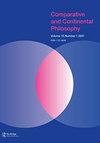Gerundive thinking in Marcia Sá Cavalcante Schuback’s Time in Exile
IF 0.3
0 PHILOSOPHY
引用次数: 0
Abstract
ABSTRACT Marcia Sá Cavalcante Schuback’s Time in Exile illuminates being in “gerundive time.” The gerundive tense (which is similar to the infinitive tense in English) captures how our being is always already “suspended” between worlds and meanings—how our being is a “non-final verb.” Schuback considers such existence in the work of Martin Heidegger, Maurice Blanchot, and Clarice Lispector. Of the three thinkers, Lispector’s writing best reveals how existence (especially existence in exile) is an “immense struggle for presence.” Schuback’s hope is that we may find a home in our homelessness.舒巴克流亡时期的Gerundive思考
摘要Marcia SáCavalcante Schuback的《流放的时间》阐明了存在于“不动名词时间”中。不动名词时态(类似于英语中的不定式时态)捕捉到了我们的存在如何总是“悬浮”在世界和意义之间——我们的存在是如何成为一个“非最终动词”的,和Clarice Lispector。在这三位思想家中,利斯佩克特的作品最能揭示存在(尤其是流亡中的存在)是一场“为存在而进行的巨大斗争”。舒巴克希望我们能在无家可归中找到归宿。
本文章由计算机程序翻译,如有差异,请以英文原文为准。
求助全文
约1分钟内获得全文
求助全文

 求助内容:
求助内容: 应助结果提醒方式:
应助结果提醒方式:


